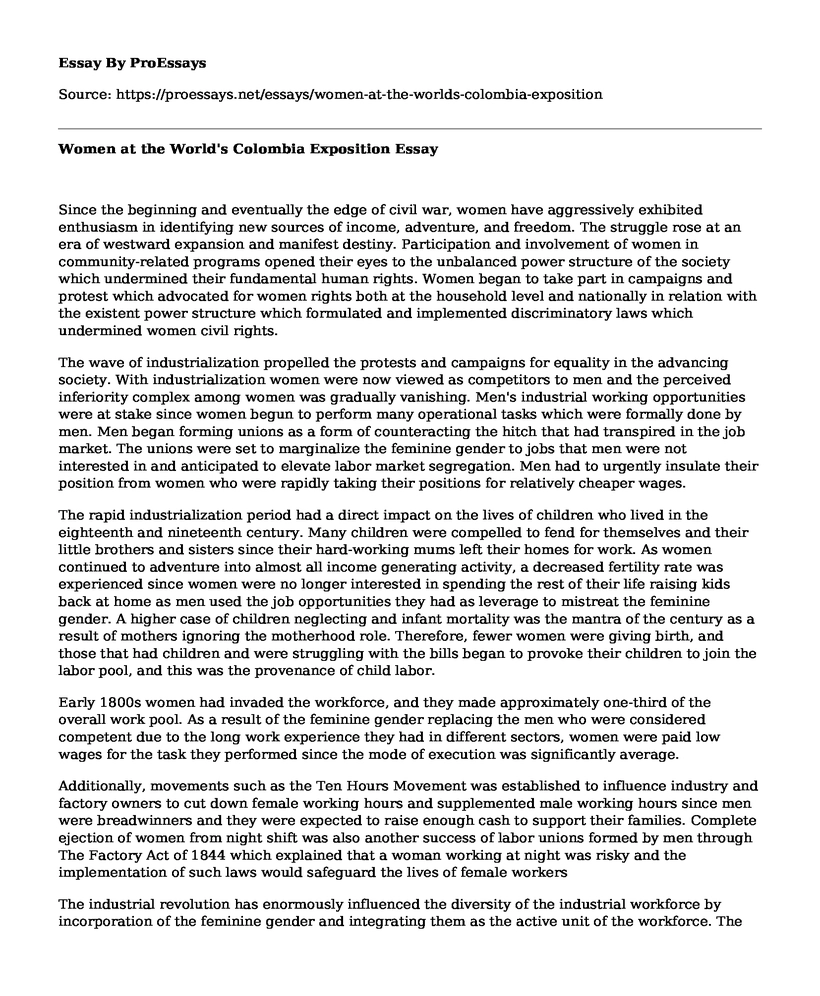Since the beginning and eventually the edge of civil war, women have aggressively exhibited enthusiasm in identifying new sources of income, adventure, and freedom. The struggle rose at an era of westward expansion and manifest destiny. Participation and involvement of women in community-related programs opened their eyes to the unbalanced power structure of the society which undermined their fundamental human rights. Women began to take part in campaigns and protest which advocated for women rights both at the household level and nationally in relation with the existent power structure which formulated and implemented discriminatory laws which undermined women civil rights.
The wave of industrialization propelled the protests and campaigns for equality in the advancing society. With industrialization women were now viewed as competitors to men and the perceived inferiority complex among women was gradually vanishing. Men's industrial working opportunities were at stake since women begun to perform many operational tasks which were formally done by men. Men began forming unions as a form of counteracting the hitch that had transpired in the job market. The unions were set to marginalize the feminine gender to jobs that men were not interested in and anticipated to elevate labor market segregation. Men had to urgently insulate their position from women who were rapidly taking their positions for relatively cheaper wages.
The rapid industrialization period had a direct impact on the lives of children who lived in the eighteenth and nineteenth century. Many children were compelled to fend for themselves and their little brothers and sisters since their hard-working mums left their homes for work. As women continued to adventure into almost all income generating activity, a decreased fertility rate was experienced since women were no longer interested in spending the rest of their life raising kids back at home as men used the job opportunities they had as leverage to mistreat the feminine gender. A higher case of children neglecting and infant mortality was the mantra of the century as a result of mothers ignoring the motherhood role. Therefore, fewer women were giving birth, and those that had children and were struggling with the bills began to provoke their children to join the labor pool, and this was the provenance of child labor.
Early 1800s women had invaded the workforce, and they made approximately one-third of the overall work pool. As a result of the feminine gender replacing the men who were considered competent due to the long work experience they had in different sectors, women were paid low wages for the task they performed since the mode of execution was significantly average.
Additionally, movements such as the Ten Hours Movement was established to influence industry and factory owners to cut down female working hours and supplemented male working hours since men were breadwinners and they were expected to raise enough cash to support their families. Complete ejection of women from night shift was also another success of labor unions formed by men through The Factory Act of 1844 which explained that a woman working at night was risky and the implementation of such laws would safeguard the lives of female workers
The industrial revolution has enormously influenced the diversity of the industrial workforce by incorporation of the feminine gender and integrating them as the active unit of the workforce. The advancement of technology resulted in a competitive atmosphere in industries and factories. In the eighteen century laboring, women had a tarnished image. They were regarded as uneducated and rude since they performed men's occupation.
In summary, the installation of the female laborers into the workforce has drastically influenced many aspects of the human society and unleashed a permanent societal and economic transformation.
Cite this page
Women at the World's Colombia Exposition. (2022, Mar 29). Retrieved from https://proessays.net/essays/women-at-the-worlds-colombia-exposition
If you are the original author of this essay and no longer wish to have it published on the ProEssays website, please click below to request its removal:
- Heuristics and Biases
- War Is a Racket (by Smedley D. Butler)
- The Role of Patriarchal Theory in Sexual Violence - Essay Sample
- Case Study on Generation Kill: A Conversation With Stanley McChrystal
- Essay Sample on Post-Traumatic Stress in Children and Adolescents Exposed to Domestic Violence
- Colonial Powers Clashed in America: France, England, Spain - Research Paper
- A Satirical Proposal: Redefining Solutions to Poverty in the United States - Paper Example







